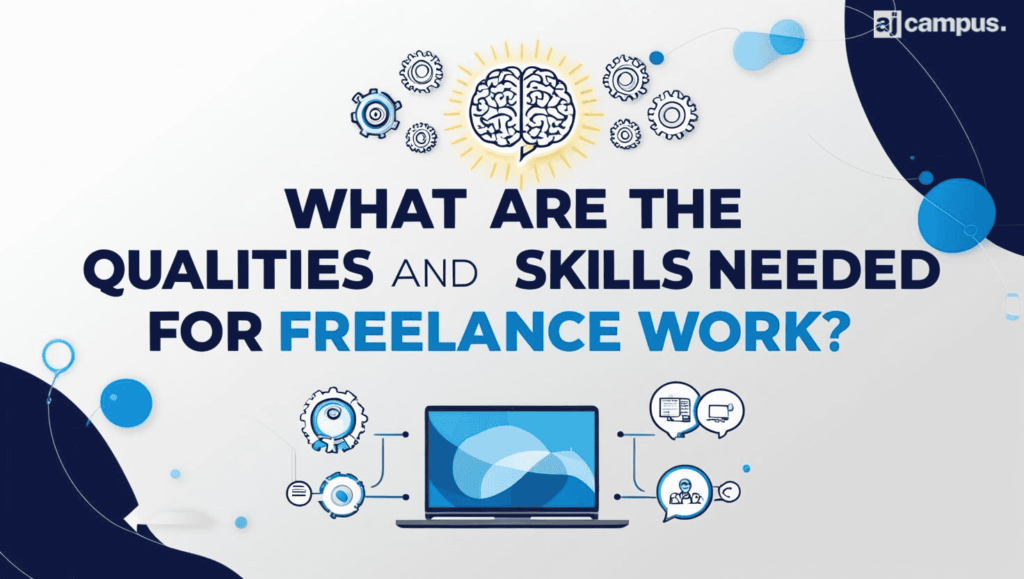How Freelancing Can Change Your Life: A Complete Guide.
By Asha Rani, Last Updated 20 Jan, 2025 9 min read

Introduction to Freelancing
Perhaps you’re asking yourself, “So What is Freelancing?” Working for yourself instead of being employed by someone else is known as freelancing. Freelancers, often known as independent contractors, are self-employed individuals.
Other businesses engage freelancers on a temporary or part-time basis, although they are not as dedicated to any one organization or paid as full-time employees.
What does the term “Freelancing” mean?
In the 1800s, a “free lance” was a mediaeval mercenary who would fight for whichever country or someone paid them the most. This is when the name “freelance” first appeared. For example, in jousting, knights would use a long weapon called a “lance” to knock opponents off their horses.
What is the process of Freelancing?
Freelancers take payments in exchange for rendering services. Usually, that agreement is temporary or part-time. For instance, if I paid a freelancer to take new headshots for me, I might stop there.
Freelancers are occasionally compensated for a predetermined number of hours per week or month. The term “retainer” is frequently used to describe that arrangement.
When you keep someone’s services or time, it’s called a retainer. A large number of solicitors practice on retainer. Regardless of whether that complete time is utilized or not, they charge the client a certain amount of time each month.
It’s actually one of the most straightforward and unadulterated types of entrepreneurship: the freelancer offers a certain good or service, and the client pay them directly.
What is meant by a Freelancer?
Knowing that the term “freelance” refers to self-employed job is crucial to understanding what it means. Professionals with specialized skill sets may work as independent contractors for other people or businesses. Instead of working as an employee of another business, the freelancer under this arrangement operates as an independent contractor. In order to achieve their financial, professional, and personal objectives, freelancers may decide to take on additional clients as needed.
By offering clients an estimate for a full project or setting up an hourly rate, businesses also decide how much they charge for particular services. They might decide to be paid on a regular basis or at the start or finish of a project. Because they like having complete control over their work schedule, project selection, and pricing, many professionals opt to work as full-time freelancers. To augment their primary income and work on projects they are enthusiastic about, other professionals could decide to work as part-time freelancers.

Why do people work as freelancers?
Individuals who freelance have a great deal of flexibility and control. The majority of independent contractors set their own schedules, selects their own projects, choose which customers they engage with, and sometimes even work from home.
As a type of entrepreneurship, freelancing gives the freelancer complete control over their earning potential. Since freelancers are not bound by a set salary, they are free to charge their clients as much as they can make.
And as a freelancer, you are your own boss. You can do a lot of different kinds of job when you freelance. Freelancing might allow you to experiment with a wide range of projects and businesses if you have a lot of interests and are an adventurous person.
Freelancing isn’t something that people usually do for a living. They either design their own products to replace their freelancing revenue, hire more employees or freelancers to build a full agency, or return to full-time employment. Many people find that freelancing gives them the flexibility they need to decide on their future professional path.
What are the risks of Freelancing?
There are some health and financial concerns associated with freelancing.
One of the main advantages of working a full-time job in the US is having access to healthcare and other financial perks beyond your regular pay. This could include health insurance offered by the business or a 401(k) retirement plan.
Employers typically won’t offer freelancers the same financial or health benefits if they recruit them as independent contractors. Therefore, when it comes to making financial plans and getting health insurance, independent contractors are on their own.
Freelancers are somewhat at a disadvantage in addition to being on their own to arrange these perks for themselves. Because they are purchasing in bulk, a firm can frequently obtain better rates when negotiating health insurance coverage with a broker. As a self-employed person, however, you are purchasing insurance just for your family and yourself.
And regrettably, that could result in higher health insurance premiums. Setting up your own retirement savings account is simple, but your company won’t match any of your payments.
Lastly, freelancers have full responsibility for all revenue received by the company. Your revenue will stop coming in if you are unable or unwilling to sell more projects and acquire more clients.
All of these hazards are controllable, but before you start working as a freelancer full-time, you should think about them.

How a freelancer can make money
The following actions will assist you in making money as a freelancer:
1. Identify your niche
Since you can focus only on one topic to offer quality services to the clients, it is possible to narrow down to just one topic. For instance, if you have years of professional experience in project management, you can work as a freelance project manager for different agencies. If the agencies are satisfied with what you’ve done for them, they will recommend you to other clients, and the chances of having a consistent workload and income are more likely the more clients you are working with.
2. Choose the clients you wish to collaborate with.
To choose the clientele you wish to work with, consider your prior job experience. Promote yourself as an employee of small firms if you have experience working with them. Potential customers want to collaborate with someone who is aware of their particular difficulties.
3. Select the charges for clients
Next, decide on project and hourly prices for the services you offer. Customers have the option of paying you at those rates or a retainer charge in exchange for your services. If you’re starting out as a freelancer, start with lesser fees so you can concentrate on meeting deadlines and cultivating customer connections. As you become more skilled and confident in the work you’re doing, you can charge more for your services. To improve your reputation as a freelancer and your pay rate from prospective clients, ask your existing clients to provide testimonials.
4. Create a portfolio website
Make a portfolio website to showcase your clients and completed projects. To demonstrate your results, list your greatest achievements since you started freelancing. Add a “about me” page where you can discuss your background, passions, and location. Provide your contact details so that potential customers can get in touch with you if they’re interested in your offerings.
The Benefits and Drawbacks of Freelance Work
A career as a freelancer has advantages and disadvantages, regardless of fit or type of job.
Benefits of Freelance Work
You are in charge: You decide what clients or assignments you wish to take on, as well as your fees and timetable. You can work in your pajamas if you want to. It is entirely up to you whether or not you want to take a three-week vacation.
Taxes could be reduced: More tax deductions for travel, meals, and other expenses are available to freelancers. Not every pay cheque has federal and state taxes deducted from it. Instead, freelancers pay the IRS directly.
You are able to earn more money: There is a high risk and a big payoff to freelancing. You can choose how much you want to get paid. It all depends on how frequently you want to work and how much you charge.
Your work-life balance is better: You don’t have to commute every day; you can go to your neighborhood coffee shop or work out for an hour whenever you’d like. It’s not necessary for freelancing to look like a regular 9–5 job.
Entrepreneurship Opportunities: Starting a business and eventually becoming an entrepreneur can be accomplished through freelancing. Freelancers can acquire abilities that will assist them develop their own businesses and attract clients. Entrepreneurs can create a profitable firm by applying their business acumen.
The Drawbacks of Freelance Work
You are in charge: I did say this twice, yes. You have to handle every choice and task when working as a freelancer, from finding clients to promoting your business. You are the company, not merely one of its employees.
You are responsible for handling your own bookkeeping, taxes, and benefits: Employers do not have to handle bookkeeping, cash flow, taxes, or benefits for freelancers. They must perform it on their own with the aid of instruments or manuals. Additionally, some of these costs—such as health insurance—are more costly than they would be through a conventional job. You cannot earn money if you do not work. Yes, you can take a three-week vacation, but during that time you might not earn any money.
Your time is money if you’re a freelancer. If you spend it carelessly, you can be forfeiting important revenue.
You may lose your work-life balance due to instability: Where your next pay cheque may come from is one of the many unknowns that come with freelancing. Any work-life balance attained by freelancing may be negated by this unpredictability. For some people, a long commute or an unfavorable schedule is worth it if their employment is stable and predictable.
Flexibility, independence, and financial opportunity are the main drivers of freelancing. Predictability of income, employment, and benefits are the main obstacles.

What are the Qualities and Skills needed for Freelance Work?
Although freelancing allows for flexibility and independence, it also requires certain abilities and characteristics to succeed in a cutthroat market. These traits can make a big impact in your freelance work, whether you’re just starting out or hoping to advance.
1. Ability to Communicate
Building and sustaining client relationships requires professional and transparent communication. Effective communication helps prevent misconceptions while discussing project details or negotiating conditions. One way to make sure everyone is in agreement is to write down the project requirements after a call.
2. Flexibility
Freelancers have to adjust to various customer requirements, job types, and sectors. You can become more adaptable and appealing to clients by being willing to change your working style or pick up new abilities. For example, taking online classes to stay current on industry trends will help you stay ahead of the competition.
3. The Ability to Solve Problems
Freelancers face a variety of unforeseen difficulties, such as last-minute customer changes and technical difficulties. Finding fast, workable answers and maintaining composure under duress are hallmarks of a skilled problem-solver. For instance, having a contingency plan, such as a different internet supplier, can help avoid task delivery delays.
4. Self-Control
For freelancers to stay productive and achieve deadlines, they need to be self-motivated. You must establish and follow your own timetable if you don’t have a manager to supervise your work. You can stay organized and finish assignments on schedule by creating a daily to-do list.
5. Managing Your Time
Effective time management is essential while working on several projects at once. Setting priorities is crucial for freelancers because they frequently deal with a variety of clients and deadlines. Google Calendar and other similar tools can help you plan your workday and make sure you don’t miss any deadlines.
6. Administration of Finances
Since income as a freelancer might fluctuate, financial management is essential. Both personal and corporate expenses, such as taxes or software subscriptions, must be budgeted for. You may track your income and expenses and be ready for tax season by using Excel sheets or expense tracking applications.
7. Networking:
Making connections developing a strong network is crucial to expanding your freelance business and acquiring new clients. Participate in industry-related social media groups, online forums, or industry events. These relationships may result in future joint ventures and employment opportunities.

Tips on how to succeed as a freelancer
The following advice can help you succeed as a freelancer:
Start when you’re employed full-time: Start doing freelance work when you have a full-time job to determine if you can complete tasks successfully and earn money. Examine the client’s comments and your revenue to see if you can make a living on your own.
Develop your abilities: Get certifications to master new skills linked to your profession. You can improve the caliber of your work and the kinds of projects you work on by concentrating on developing your skills. An online editing course can be taken by a freelance writer, who can then work on editing tasks after finishing the course.
Recognize when to decline certain tasks: Give clients time that will increase your revenue and freelance reputation. Reject assignments that are outside of your area of expertise or if you would want to devote more time to other clients.
Conclusion
Being self-employed entails being your own boss. Whether you want to work directly with clients, subcontract, or use a jobs marketplace and freelancing websites like fiverr, upwork etc, it is your responsibility to find a means to occupy your time with paid employment.
More businesses than ever before are hiring freelancers, and there are dozens upon dozens of various kinds of Freelancing work. There are trade-offs in terms of financial and health benefits, but freelancing may be a fantastic way to make a career on your own terms.
Related FAQs
What is freelancing?
Freelancing is essentially a type of self-employment. Since you don’t work primarily for one company as a freelancer, you can reside anywhere there is a dependable internet connection. You are in charge of who you work for and when you work.
Is working as a freelancer a good career?
Other difficulties include irregular work schedules, unpredictable workloads, and payment delays. However, because of its advantages, freelancing can be a fruitful and satisfying employment choice. You’ll need both personal and practical talents to get through the challenging terrain.
How to start freelance work?
Here are some points on How to start freelancing:
1. Describe your offering and service.
2. Determine who your target audience is.
3. Create a price plan.
4. Create a stunning portfolio.
5. Compose a fantastic proposal.
6. Build a rapport with your customer.
7. Keep improving your abilities.
8. Connect with other independent contractors.
Is it safe to freelance?
Even though most customers are reliable and will make their payments on schedule, you should nonetheless exercise caution. Before you begin working, make sure you have a written agreement on the deliverables, pricing, and terms of payment, even if you don’t have a formal contract in place.
How many different kinds of freelancing are there?
The most popular professions for freelancers include marketing, web development, graphic design, and writing. Anything artistic and talented really. However, since so many occupations are now done remotely, the idea of freelancing has grown significantly. There are many website for freelancing that one can visit to kick start their career.




